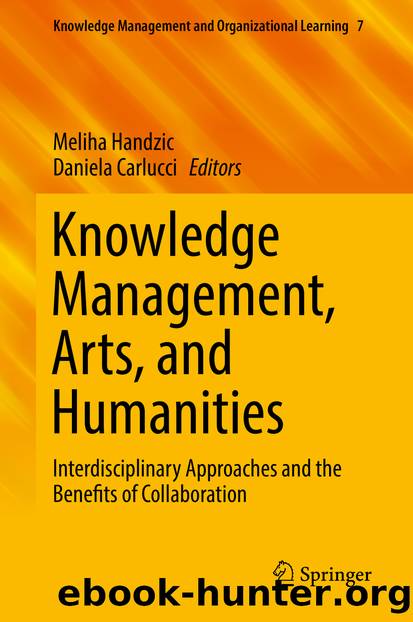Knowledge Management, Arts, and Humanities by Unknown

Author:Unknown
Language: eng
Format: epub
ISBN: 9783030109226
Publisher: Springer International Publishing
2.4 Researchers’ Practices
After explaining the need for virtual research environments and exploring knowledge organisation-related concepts, this section turns to the practices of researchers that need to shape the design of a humanities knowledge space. So far, there have been several attempts to model research behaviour of individual digital scholars. Some of these models focus on research processes in the analysis (Unsworth 2000; Antonijevic 2015) and visualisation of data (Fry 2007). Other models relate humanities data with computing tools (Jessop 2004). Despite the fact that some scholars developed large-scale empirical studies of researchers’ behaviour (Antonijevic 2015), they all present workflows in a linear way.
In general, empirical research failed to develop a portrait of the typical researcher in the current virtual research environment (Connaway and Dickey 2009). This is not surprising given that different individuals have different inquiry styles and may not follow the linear workflow models suggested by the humanities literature (Unsworth 2000; Antonijevic 2015). Rather, different individuals may exhibit behavioural characteristics of some of five philosophers (Leibniz, Locke, Kant, Hegel and Singer) who have different styles of interacting and interpreting knowledge (Handzic and Lin 2003).
Generally, Leibnizian inquirers rely heavily on the study of documents. Lockeans like to share their observations and create consensus. Kantians seek knowledge by scanning and combining ideas from a wide variety of resources and unusual associations. Hegelians tend to construct and debate different viewpoints and generate new solutions. Finally, Singerians are most flexible and comfortable with all systems of enquiry.
From a knowledge management (KM) perspective (Handzic 2004), a VKS design should provide technological support for knowledge exploitation (of what is known) and exploration (of unknown domains). Technology should also support knowledge codification (focused on explicit knowledge contained in digital objects) and personalisation (orientated towards people and tacit knowledge held in their heads). Furthermore, VKS must be flexible and interactive and accommodate different research needs and styles of individual researchers. In view of the above, a comprehensive holistic approach adapted from Handzic (2004) that unifies stock, process and enabling technology aspects of knowledge is proposed as a basis for modelling a virtual knowledge space (VKS) for the digital humanities scholars.
Download
This site does not store any files on its server. We only index and link to content provided by other sites. Please contact the content providers to delete copyright contents if any and email us, we'll remove relevant links or contents immediately.
Kathy Andrews Collection by Kathy Andrews(10520)
The remains of the day by Kazuo Ishiguro(7551)
Spare by Prince Harry The Duke of Sussex(4196)
Paper Towns by Green John(4169)
The Body: A Guide for Occupants by Bill Bryson(3801)
Be in a Treehouse by Pete Nelson(3212)
Harry Potter and the Goblet Of Fire by J.K. Rowling(3045)
Goodbye Paradise(2963)
Never by Ken Follett(2880)
Into Thin Air by Jon Krakauer(2701)
The Remains of the Day by Kazuo Ishiguro(2618)
The Genius of Japanese Carpentry by Azby Brown(2609)
The Cellar by Natasha Preston(2595)
Drawing Shortcuts: Developing Quick Drawing Skills Using Today's Technology by Leggitt Jim(2532)
120 Days of Sodom by Marquis de Sade(2438)
Architecture 101 by Nicole Bridge(2350)
The Man Who Died Twice by Richard Osman(2299)
Machine Learning at Scale with H2O by Gregory Keys | David Whiting(2291)
Fairy Tale by Stephen King(2069)
